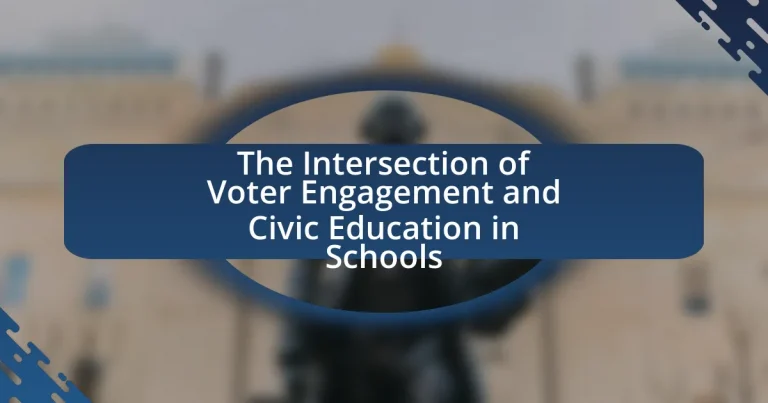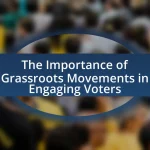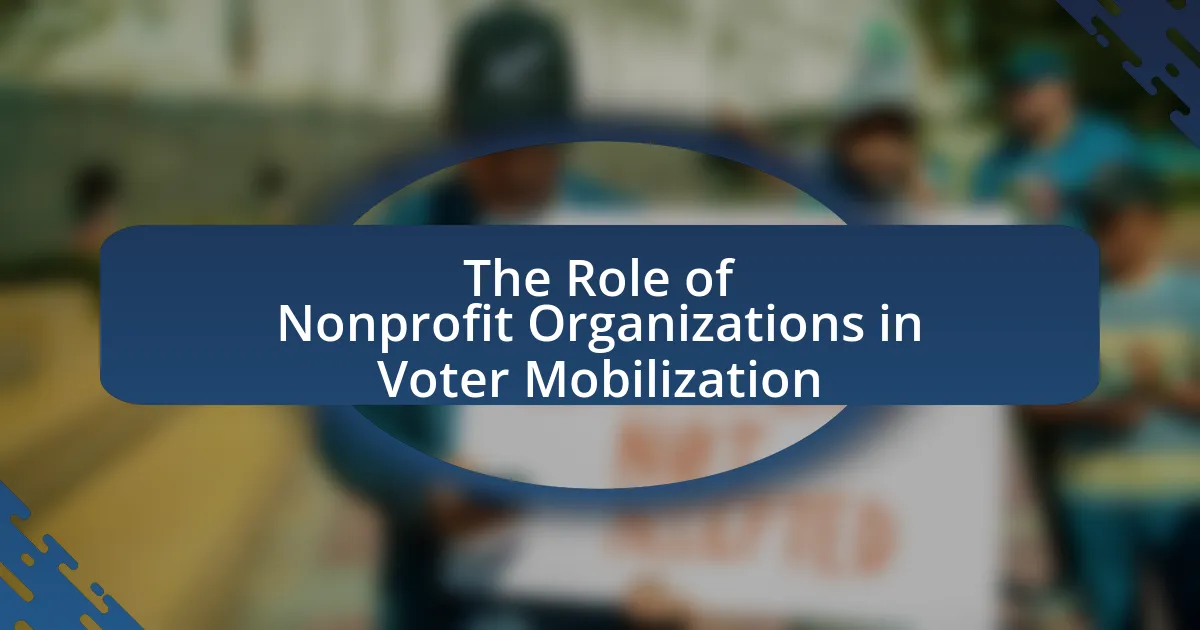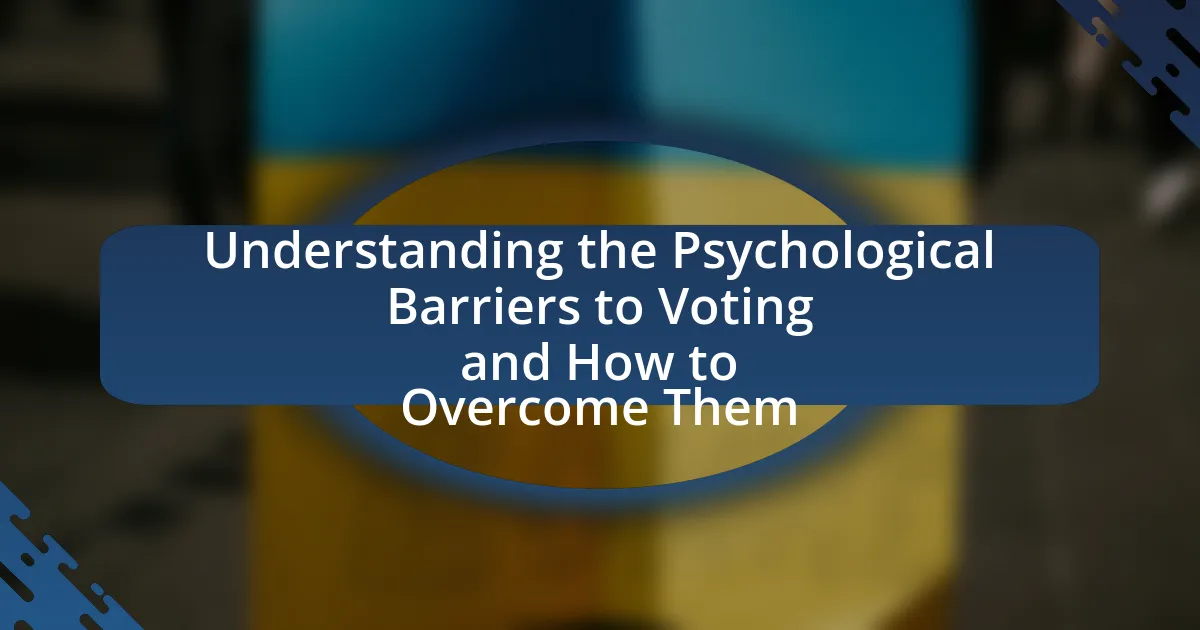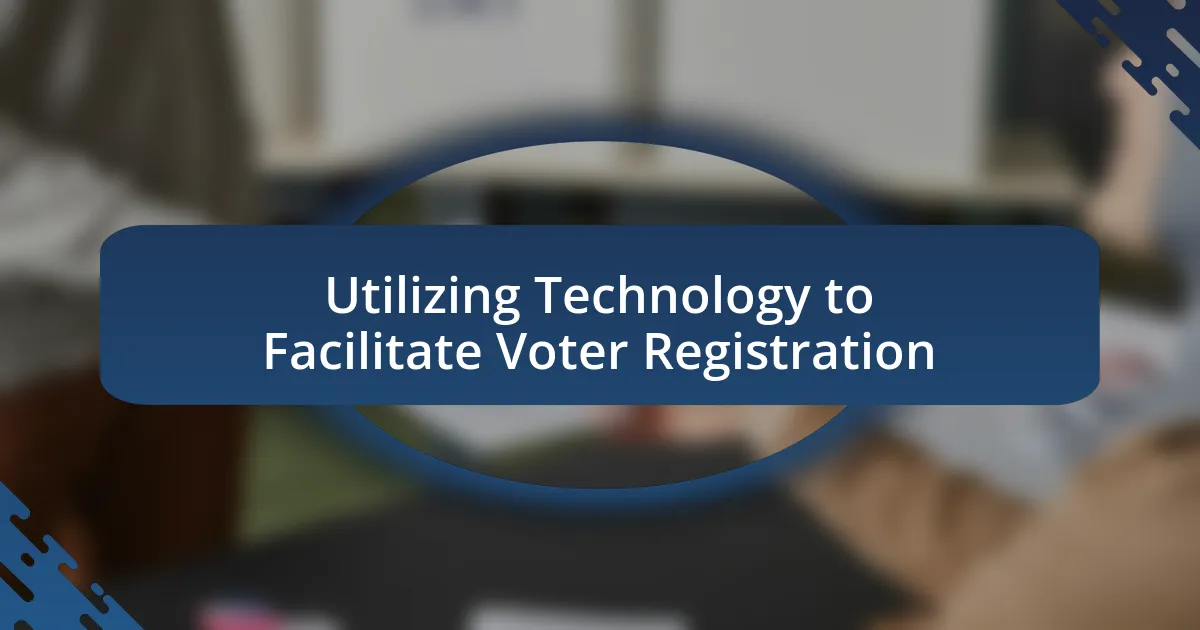The article examines the intersection of voter engagement and civic education in schools, highlighting how integrating civic knowledge with practical electoral participation fosters informed and active citizens. It discusses the relationship between civic education and voter engagement, emphasizing that comprehensive civic education significantly increases the likelihood of students voting and participating in community activities. Key components of effective voter engagement in schools include education about the electoral process, opportunities for civic participation, and fostering a culture of political discussion. The article also addresses current practices, challenges, and strategies for enhancing civic education, ultimately demonstrating the long-term benefits of preparing students for active citizenship and its positive impact on democratic participation.
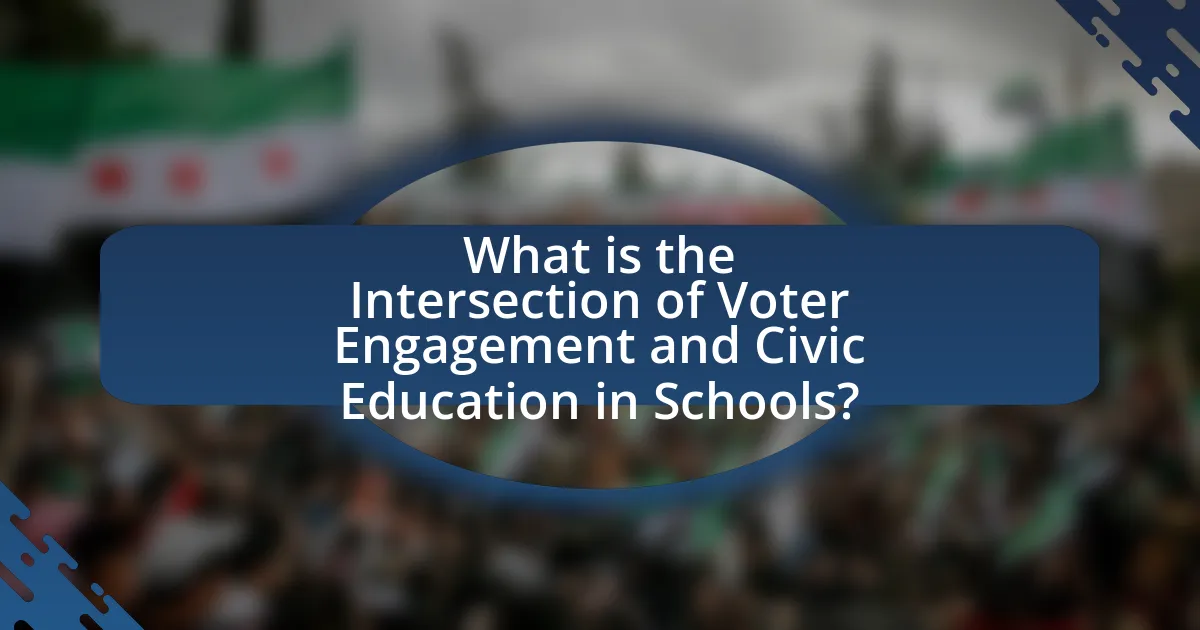
What is the Intersection of Voter Engagement and Civic Education in Schools?
The intersection of voter engagement and civic education in schools is the integration of teaching students about their rights and responsibilities as citizens with practical opportunities to participate in the electoral process. Civic education equips students with knowledge about government structures, electoral systems, and the importance of voting, while voter engagement initiatives encourage active participation in elections, such as mock elections and voter registration drives. Research indicates that students who receive comprehensive civic education are more likely to vote and engage in community activities, demonstrating the effectiveness of this intersection in fostering informed and active citizens.
How do voter engagement and civic education relate to each other?
Voter engagement and civic education are closely related as civic education equips individuals with the knowledge and skills necessary to participate effectively in the democratic process. Civic education teaches the principles of democracy, the importance of voting, and the functioning of government, which directly influences voter engagement by fostering informed and active citizens. Research indicates that students who receive comprehensive civic education are more likely to vote and engage in political activities; for instance, a study by the Center for Information and Research on Civic Learning and Engagement found that high school students who participated in civic education programs had a 20% higher likelihood of voting in elections compared to their peers without such education. This demonstrates that civic education serves as a foundational element that enhances voter engagement by promoting awareness and participation in democratic processes.
What are the key components of voter engagement in schools?
The key components of voter engagement in schools include education about the electoral process, opportunities for civic participation, and fostering a culture of discussion around political issues. Education about the electoral process equips students with knowledge about voting rights, registration, and the significance of their participation in democracy. Opportunities for civic participation, such as mock elections and student government, allow students to practice voting and understand the implications of their choices. Fostering a culture of discussion encourages students to engage with diverse perspectives and develop critical thinking skills regarding political issues. These components collectively enhance students’ understanding and involvement in the democratic process, as evidenced by studies showing that civic education increases voter turnout among young adults.
How does civic education influence voter engagement among students?
Civic education significantly enhances voter engagement among students by equipping them with the knowledge and skills necessary to participate in democratic processes. Research indicates that students who receive comprehensive civic education are more likely to vote and engage in political discussions, as they understand the importance of their participation in democracy. For instance, a study by the Center for Information and Research on Civic Learning and Engagement (CIRCLE) found that students who took civic education courses were 20% more likely to vote in elections compared to those who did not receive such education. This correlation demonstrates that informed students are more inclined to exercise their voting rights, thereby fostering a more engaged electorate.
Why is voter engagement important for students?
Voter engagement is important for students because it fosters civic responsibility and empowers them to influence the democratic process. Engaging in voting helps students understand their rights and the impact of their participation on local and national issues. Research indicates that students who participate in elections are more likely to remain engaged in civic activities throughout their lives, contributing to a more informed and active citizenry. For instance, a study by the Center for Information & Research on Civic Learning and Engagement found that young voters who engage in the electoral process are more likely to vote in future elections, highlighting the long-term benefits of early voter engagement.
What impact does early voter engagement have on future voting behavior?
Early voter engagement significantly increases the likelihood of individuals participating in future elections. Research indicates that individuals who engage in voting early are more likely to develop a habit of voting, leading to higher turnout rates in subsequent elections. For instance, a study by the U.S. Census Bureau found that voters who participated in early voting were 10% more likely to vote in future elections compared to those who did not engage early. This pattern suggests that early voter engagement fosters a sense of civic responsibility and reinforces the importance of participation in the democratic process.
How does voter engagement contribute to a healthy democracy?
Voter engagement is essential for a healthy democracy as it ensures that citizens actively participate in the electoral process, influencing governance and policy decisions. When individuals engage in voting, they express their preferences and priorities, which leads to elected representatives who are more accountable to the electorate. Research indicates that higher voter turnout correlates with increased government responsiveness and improved public trust in political institutions. For instance, the U.S. Census Bureau reported that in the 2020 presidential election, voter turnout reached 66.8%, the highest in over a century, reflecting a strong public interest in civic participation and its impact on democratic legitimacy.
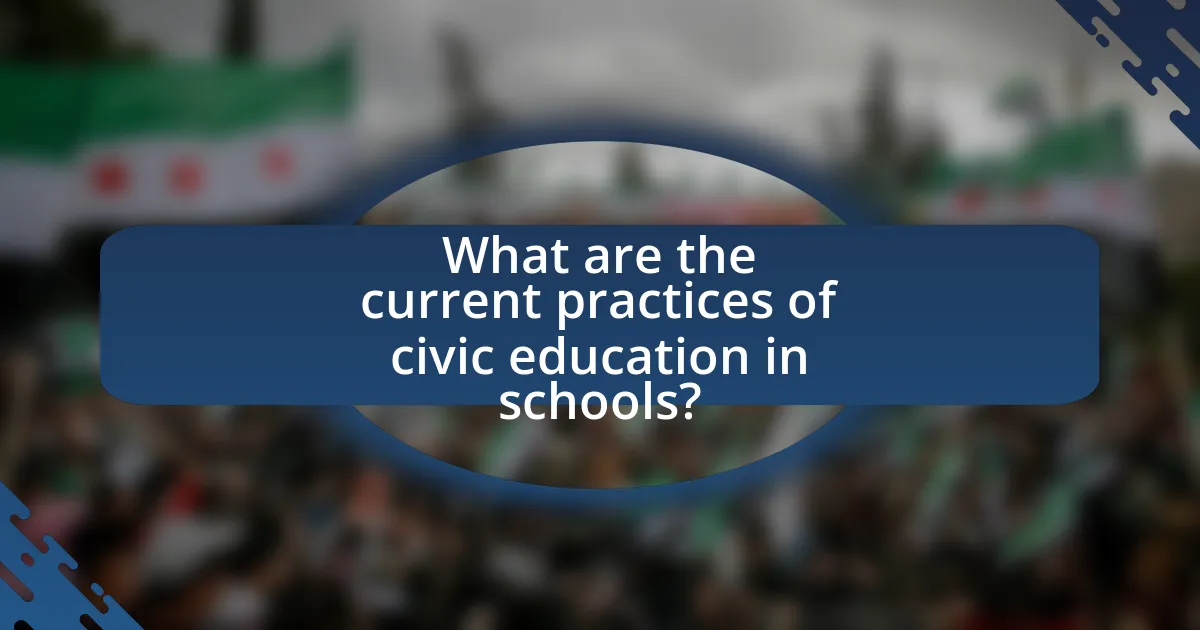
What are the current practices of civic education in schools?
Current practices of civic education in schools include integrating civic knowledge, skills, and dispositions into the curriculum through various methods such as project-based learning, simulations, and community service. Schools often utilize programs that encourage student participation in local governance, such as student councils and mock elections, which help students understand democratic processes. Research indicates that these practices enhance students’ civic engagement and knowledge; for instance, a study by the Center for Information and Research on Civic Learning and Engagement found that students who participate in civic education programs are more likely to vote and engage in community activities.
How is civic education implemented in school curricula?
Civic education is implemented in school curricula through structured courses that focus on the principles of democracy, government functions, and civic responsibilities. These courses often include topics such as the Constitution, the electoral process, and the importance of civic participation. For instance, the National Council for the Social Studies emphasizes the need for students to engage in discussions about current events and participate in community service, which reinforces their understanding of civic duties. Additionally, many states have adopted specific standards for civic education, ensuring that students receive instruction that prepares them for informed participation in democratic processes.
What subjects or activities promote civic education effectively?
Subjects and activities that promote civic education effectively include social studies, history, and service-learning projects. Social studies curricula often cover government structures, civic responsibilities, and the rights of citizens, which are essential for understanding civic engagement. History classes provide context on past civic movements and the evolution of democratic principles, reinforcing the importance of participation in governance. Service-learning projects engage students in community service while reflecting on civic responsibilities, fostering a practical understanding of civic involvement. Research indicates that students who participate in these subjects and activities demonstrate higher levels of civic knowledge and engagement, as evidenced by studies showing increased voter turnout among those with strong civic education backgrounds.
How do teachers assess students’ understanding of civic responsibilities?
Teachers assess students’ understanding of civic responsibilities through various methods, including formative assessments, discussions, projects, and standardized tests. Formative assessments, such as quizzes and reflective journals, allow teachers to gauge students’ grasp of civic concepts in real-time. Discussions in class encourage students to articulate their understanding and engage with peers, fostering critical thinking about civic duties. Projects, such as community service or civic engagement initiatives, provide practical applications of civic responsibilities, allowing teachers to evaluate students’ ability to apply knowledge in real-world contexts. Standardized tests may also include questions specifically designed to measure understanding of civic education content, ensuring that assessments align with educational standards.
What challenges do schools face in promoting civic education?
Schools face several challenges in promoting civic education, including limited resources, varying levels of teacher preparedness, and a lack of standardized curriculum. Limited funding often restricts the availability of materials and programs necessary for effective civic education. Additionally, many educators may not have received adequate training in civic topics, leading to inconsistent teaching quality. Furthermore, the absence of a unified curriculum means that civic education can be deprioritized in favor of other subjects, resulting in students receiving insufficient exposure to essential civic concepts. These factors collectively hinder the effectiveness of civic education in fostering informed and engaged citizens.
How do funding and resources affect civic education programs?
Funding and resources significantly impact civic education programs by determining the quality and accessibility of educational materials and experiences. Adequate funding allows schools to develop comprehensive curricula, hire qualified educators, and provide necessary resources such as textbooks, technology, and extracurricular activities that promote civic engagement. For instance, a study by the Center for Information & Research on Civic Learning and Engagement found that schools with higher funding levels are more likely to offer robust civic education programs, leading to increased student participation in civic activities. Conversely, limited funding restricts these programs, resulting in a lack of engagement opportunities and diminished student understanding of civic responsibilities.
What role do community partnerships play in enhancing civic education?
Community partnerships play a crucial role in enhancing civic education by providing resources, expertise, and real-world experiences that enrich the learning environment. These partnerships facilitate collaboration between schools and local organizations, such as non-profits, government agencies, and civic groups, which can offer programs, workshops, and mentorship opportunities focused on civic engagement. For instance, research by the Center for Information and Research on Civic Learning and Engagement (CIRCLE) indicates that students involved in community-based civic education programs demonstrate higher levels of civic knowledge and engagement compared to their peers. This evidence underscores the effectiveness of community partnerships in fostering a deeper understanding of civic responsibilities and encouraging active participation in democratic processes.
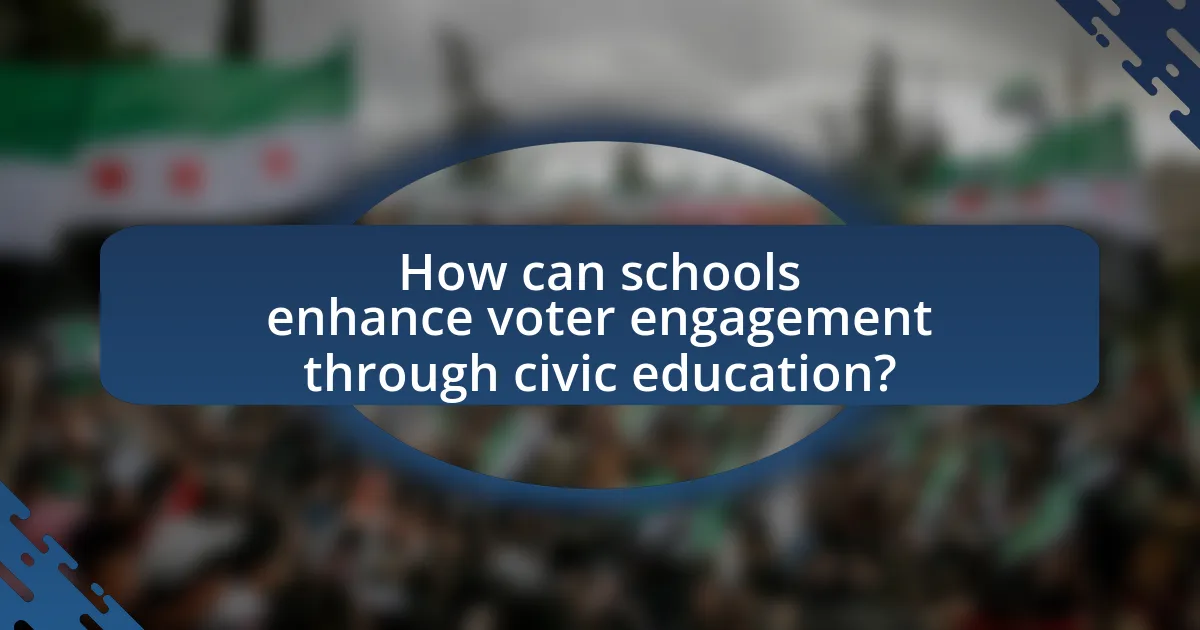
How can schools enhance voter engagement through civic education?
Schools can enhance voter engagement through civic education by implementing comprehensive curricula that focus on the importance of voting, the electoral process, and civic responsibilities. Research indicates that students who receive structured civic education are more likely to participate in elections; for instance, a study by the Center for Information and Research on Civic Learning and Engagement found that high school students who took a civics course were 20% more likely to vote than those who did not. Additionally, schools can facilitate mock elections and community service projects that connect students with local governance, further fostering a sense of civic duty and engagement.
What strategies can be employed to increase student participation in elections?
To increase student participation in elections, schools can implement strategies such as integrating civic education into the curriculum, organizing voter registration drives, and facilitating discussions on the importance of voting. Research indicates that students who receive comprehensive civic education are more likely to engage in electoral processes; for instance, a study by the Center for Information & Research on Civic Learning and Engagement found that civic education significantly boosts youth voter turnout. Additionally, creating a supportive environment that encourages open dialogue about political issues can empower students to feel their voices matter, further enhancing their likelihood of participating in elections.
How can schools create a culture of voting among students?
Schools can create a culture of voting among students by integrating civic education into the curriculum and promoting active participation in the electoral process. This can be achieved through programs that educate students about their voting rights, the importance of civic engagement, and the mechanics of the voting process. For instance, schools can organize mock elections, debates, and discussions on current issues, which have been shown to increase students’ understanding and interest in voting. Research indicates that students who participate in such activities are more likely to vote when they reach voting age, as evidenced by a study from the Center for Information and Research on Civic Learning and Engagement, which found that civic education significantly boosts youth voter turnout.
What role do student-led initiatives play in promoting voter engagement?
Student-led initiatives play a crucial role in promoting voter engagement by empowering young people to take an active role in the democratic process. These initiatives often include organizing voter registration drives, hosting informational sessions about the voting process, and facilitating discussions on civic issues, which directly increase awareness and participation among their peers. For example, a study by the Center for Information and Research on Civic Learning and Engagement (CIRCLE) found that students who participate in such initiatives are more likely to vote in elections, demonstrating a tangible impact on voter turnout. By fostering a sense of responsibility and community involvement, student-led initiatives effectively bridge the gap between civic education and active voter participation.
What best practices can schools adopt for effective civic education?
Schools can adopt project-based learning as a best practice for effective civic education. This approach engages students in real-world issues, fostering critical thinking and collaboration. Research indicates that project-based learning enhances student motivation and retention of civic knowledge, as evidenced by a study from the Buck Institute for Education, which found that students involved in such projects demonstrated higher levels of civic engagement and understanding of democratic processes. Additionally, integrating service-learning opportunities allows students to apply civic knowledge in their communities, further reinforcing their understanding of civic responsibilities and the importance of participation in democratic processes.
How can experiential learning enhance civic education outcomes?
Experiential learning enhances civic education outcomes by providing students with hands-on opportunities to engage in real-world civic activities, which fosters a deeper understanding of democratic processes. This method allows students to apply theoretical knowledge in practical settings, such as participating in community service, attending town hall meetings, or conducting mock elections. Research indicates that students who engage in experiential learning demonstrate higher levels of civic knowledge, skills, and dispositions compared to those who learn through traditional methods. For instance, a study by the Center for Information & Research on Civic Learning and Engagement found that students involved in service-learning projects are more likely to vote and participate in civic activities as adults.
What resources are available for educators to improve civic education?
Educators can access a variety of resources to enhance civic education, including curriculum guides, online platforms, and professional development programs. Notable resources include the Center for Civic Education, which offers comprehensive lesson plans and materials focused on civic knowledge and engagement. Additionally, the National Council for the Social Studies provides standards and resources that support civic education in social studies curricula. The iCivics platform, founded by Justice Sandra Day O’Connor, offers interactive games and lesson plans designed to teach students about government and civic responsibilities. These resources are validated by their widespread use in schools and their alignment with educational standards aimed at fostering informed and engaged citizens.
What are the long-term benefits of integrating voter engagement and civic education in schools?
Integrating voter engagement and civic education in schools fosters informed and active citizenship among students, leading to higher rates of voter participation in adulthood. Research indicates that students who receive civic education are more likely to vote, with studies showing that civic education can increase turnout by 10-20%. Additionally, such integration cultivates critical thinking, enhances understanding of democratic processes, and promotes social responsibility, which are essential for a healthy democracy. By equipping students with the knowledge and skills necessary for civic participation, schools contribute to the development of engaged citizens who are more likely to advocate for their communities and participate in public discourse.
How does this integration prepare students for active citizenship?
This integration prepares students for active citizenship by equipping them with the knowledge and skills necessary to participate effectively in democratic processes. Through civic education, students learn about their rights and responsibilities, the functioning of government, and the importance of voting, which fosters a sense of civic duty. Research indicates that students who engage in civic education programs are more likely to vote and participate in community activities, as evidenced by a study from the Center for Information & Research on Civic Learning and Engagement, which found that students who received civic education were 20% more likely to vote in elections. This combination of voter engagement and civic education cultivates informed, responsible citizens who are prepared to contribute to their communities and the democratic process.
What evidence supports the effectiveness of civic education on voter turnout?
Civic education significantly enhances voter turnout, as evidenced by various studies. Research conducted by the Center for Information & Research on Civic Learning and Engagement (CIRCLE) indicates that students who receive comprehensive civic education are more likely to participate in elections. Specifically, a study found that high school students who engaged in civic learning opportunities were 20% more likely to vote compared to their peers who did not receive such education. Additionally, the National Assessment of Educational Progress (NAEP) reported that students with higher civic knowledge demonstrated greater likelihoods of voting in their early adulthood. These findings collectively underscore the positive correlation between civic education and increased voter participation.
